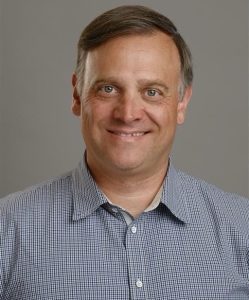By Ignacio Lobos | UW-IT Strategic Communications
When Jared Reimer joined the computer science program at UW nearly 30 years ago, the 17-year-old was more likely to find mentions of artificial intelligence (AI) in science fiction rather than the classroom.
Today, AI is on the cusp of becoming the most transformative technology of the 21st century — and as Reimer and many other tech industry leaders see it, more important than the Internet, cell phone or just about any other electronic gadget we put our hands on.
“This is a once-in-a-generation innovation, perhaps one of the most significant advances in technology in the last 100 years,” said Reimer, who has returned to the University as Lead AI Architect for University of Washington Information Technology (UW-IT).
“AI, no doubt, will change the world in ways we cannot imagine,” he said.
Hiring Reimer underscores UW-IT’s commitment to ensure AI will deliver on its promises and give UW a competitive advantage over other major universities, said Bin Guo, Associate Vice President of Infrastructure and CTO.
“This is a critical role for UW-IT and UW at large at this pivotal moment of the AI age,” Guo said. “Jared will help shape and implement our AI strategy to transform UW into a leading AI-powered University.”
UW alum brings rich AI experience across industries
Jared is no stranger to technology, even to the hype and promise of earlier technologies that have failed to deliver. But AI is not a passing fad, he said, pointing to his own children’s immediate adoption of Chat GPT and other generative AI technologies.

“How we interact with technology will change fundamentally with AI,” said Reimer, an early Internet and cloud services industries pioneer.
Reimer grew up in rural Kitsap County, not far from UW, where he earned undergrad and graduate degrees in computer science. He started his career building core Internet infrastructure including oz.net (early dial-up ISP) and the Seattle Internet eXchange, the world’s largest free internet exchange point.
Later, he founded Cascadeo, an international professional and managed services firm. The company, which placed in the global Gartner Magic Quadrant for Public Cloud IT Transformation Services, was acquired in 2020 by a leading telecommunications provider in Asia.
Most recently, he served as Cascadeo’s CTO post-acquisition and led the cascadeo.ai SaaS product, the world’s first enterprise cloud management platform to leverage generative AI.
If you haven’t heard his name, you may know some of the things he has been involved in: launching the Nest Learning Thermostat, designing and building CenturyLink Cloud’s global monitoring infrastructure and serving as senior technical advisor to HBO’s Emmy award-winning comedy “Silicon Valley.”
Because of his expertise in cloud computing and AI, he’s become a sought-after speaker, including appearances at Goldman Sachs, AWS re:Invent, Warburg Pincus, KeyBanc, NANOG, CNN Philippines, The Wall Street Journal and many others, including guest lectures at UW.
Critical time for AI at UW
While a firm believer that AI is a force for good, Reimer also understands you need a strong plan and strategy to deliver AI that will advance the mission of the University.
“With any dual-use technology, we risk making a wrong turn,” he said, pointing to his favorite movie, Terminator 2: Judgement Day. “That movie was far ahead of its time and today, it’s more relevant than ever in the age of AI,” he said.
But we will not have a terminator day if we pay attention to how we deploy and police AI, he said. And we also can’t turn the clock back. AI is not going away — it continues to grow at a rapid pace across the globe.
“The ethical use of AI is of vital importance, especially in a university setting,” he said. “Building fairness around the system and guarding against bias are not terms we just throw around. We are deeply committed to UW’s mission and guiding principles.”
“Our work with AI foremost exists to serve the UW and its many stakeholders equitably,” he said. “It also aims to set a very high bar for others to follow.”
More information
Jared Reimer now helps lead UW’s new AI Community of Practice. Join today via UW Teams!
